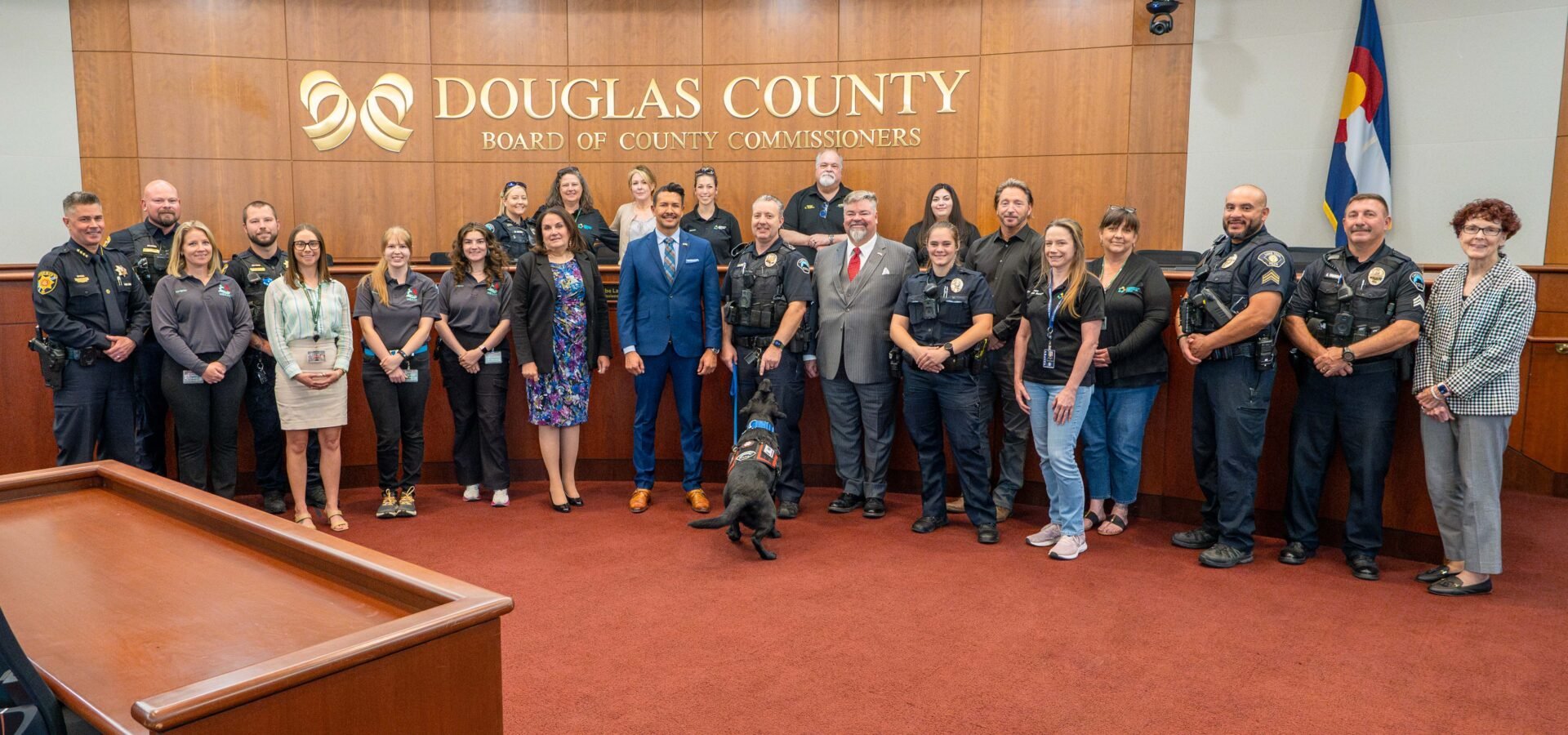Pictured: Members of Douglas County CRT and HEART with Douglas County Commissioners
You’ve read the research that unaddressed mental health issues can lead to much larger issues – no matter where you live. But did you know there are dedicated teams in Douglas County prepared to respond to those who need support where they are?
Seven days a week, across the county, crisis-trained, master’s level mental health clinicians are responding to the scene alongside law enforcement, ensuring those in crisis get the mental health resources and services they need.
The Board of Douglas County Commissioners is honoring the extraordinary contributions of these unique partnerships by declaring Sept. 15-21, 2024, as Douglas County Co-Responders Week. Douglas County currently has 13 teams using the co-response model to respond to a variety of calls for service including those in need of mental health resources and help for those experiencing homelessness.
In 2017, Douglas County launched Community Response Teams, which pair a law enforcement officer with a mental health professional to help adults and youth experiencing a mental health crisis avoid the emergency room or jail and, instead, find the support they need to heal.
Now, teams include officers and deputies from Castle Rock Police, the Douglas County Sheriff’s Office, Lone Tree Police and Parker Police – with response capability seven days a week. Two of those teams focus solely on youth response, covering every school – public, private and charter – in Douglas County.
“It is important to recognize the incredible dedication and hard work of our deputies and mental health professionals who step in during some of the most challenging moments in people’s lives,” said Douglas County Sheriff Darren Weekly. “Their commitment to providing compassionate care ensures that those in crisis get the care and support they need, often preventing situations from escalating. This collaborative effort is vital to the safety and well-being of our residents, and I’m proud of the role our deputies play in making Douglas County a safer, healthier place to live.”
To date, these Community Response Teams have responded to 12,696 emergency and non-emergency calls for service and provided crisis intervention, conducted important follow-ups, implemented safety plans and helped nearly 8,000 people get connected with the resources and help they need.
In 2022, Douglas County launched another co-response team, called Homeless Engagement Assistance and Resource Team (HEART), focused on helping people experiencing homelessness.
HEART Navigators are subject matter experts, also with experience in behavioral and mental health or case management, who proactively and directly interact with those experiencing homelessness in a compassionate way. They gather information on needs, assess vulnerability, provide complete case management, and make referrals to appropriate community services.
As of 2024, HEART has responded to more than 2,500 referrals and calls for service and served 445 people, helping to effectively end homelessness in Douglas County.
Partnered with law enforcement, this community approach helps ensure people experiencing homelessness do not end up in emergency rooms or jail, but rather are directed to community services.
To contact a member of the HEART team please call 303-660-7301 or complete the online referral form.
“The co-responder model works,” said Commissioner Abe Laydon, chair of the Douglas County Homeless Initiative. “We’ve seen the success for years with our Community Response Teams. Now, we’re seeing this model work to end homelessness.”
Community Response Teams are dispatched in response to specific 911 calls, as determined by the dispatcher. In addition to calling 911 for help, there are two specific resources if you or a loved one is experiencing a mental health crisis or thoughts of suicide:
988: Dial 988 for 24/7, free and confidential support for mental health, substance use or an emotional crisis.
Colorado Crisis Services: Call 1.844.493.TALK (8255) or text TALK to 38255. This agency has trained counselors who are available 24/7/365 to work with persons in crisis and the people supporting them.

